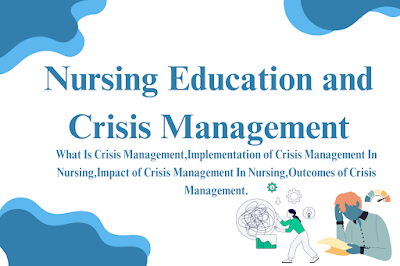Nursing Education and Crisis Management What is Crisis Management?
Crisis management is a systematic approach involving a series of steps to intervene and establish order in situations where events or stressors threaten to disrupt an individual’s, group’s, or community’s state of equilibrium. The fundamental steps of crisis management include assessing the individual and the problem, planning the intervention, implementing the intervention, resolving the crisis, and engaging in anticipatory planning to prevent future crises (Elders, 2008).
Implementation of Crisis Management in Nursing
In nursing education, students frequently encounter crises as they progress through their programs. Effective crisis management for nursing students can decrease stress and provide them with focused strategies for success. To address a crisis effectively, the issue must first be identified and defined. A team approach, including faculty and students, is essential in this process. Students should describe their problems, and faculty should assist with developing a planned approach to manage the crisis.
Key steps in implementing crisis management in nursing education include:
- Identifying and Defining the Crisis: Faculty and students collaboratively identify the problem and its aspects. This process may uncover clues to the problem’s severity, which will inform the planning of appropriate interventions.
- Planning the Intervention: Once a problem is identified, a structured plan can be developed to guide the intervention. The intervention plan should include specific actions to address the issue and clear objectives to evaluate progress.
- Implementing the Intervention: The plan is put into action, and measures are taken to mitigate the crisis. The faculty and student collaboratively monitor and adjust the intervention as necessary.
- Evaluating Outcomes: As the crisis is addressed, outcomes are evaluated to determine whether the intervention has been successful. If the crisis is not resolved, a reassessment of the problem is conducted, and alternative approaches may be attempted.
- Anticipatory Planning: After resolving a crisis, planning should focus on preventing future occurrences. Faculty and students must identify potential triggers and develop strategies to manage or avoid these triggers proactively (Reinhardt, Keller, Ochart Summers, & Schultz, 2012).
Common situations that can precipitate a crisis for nursing students include high-stakes testing, such as standardized entrance and exit examinations or the NCLEX-RN licensing examination, and clinical evaluations under observation. Anticipatory planning by faculty can help minimize the potential for such crises by preparing students adequately and providing appropriate support.
Impact of Crisis Management in Nursing
The literature on crisis management extends to various fields, including business environments and health care. In nursing education, crisis management is typically focused on addressing emergencies that may arise during clinical training or academic studies.
Behavioral Theories Applied to Crisis Management:
- Behavior Modification Model: Encourages remediation of coping skills using positive and negative reinforcement to modify behaviors.
- Health Belief Model: Focuses on reducing environmental barriers to facilitate behavior change.
- Social Learning Theory: Emphasizes the role of perceived skill use and reinforcement in directing behavior.
- Self-Management Models: Highlight the importance of self-regulation and self-efficacy in behavior change.
- Social Support Theories: Stress the reinforcement found through social networks and the positive impact of social support on crisis management.
- Theory of Reasoned Action: Highlights how perceptions of social processes and norms influence behavior change.
- Trans-theoretical Model: Suggests that crisis management should align actions with both cognitive and behavioral stages of change.
Effective crisis management supports behavior change by ensuring students have positive intentions, face minimal barriers, perceive themselves as capable, believe that positive behaviors will be reinforced, and feel that their actions align with their self-image (Elder et al., 1999).
Crisis Prevention and Management in Nursing Education:
Prevention is a key component of crisis management. Anticipatory planning and forecasting based on previous events can help prevent crisis situations. For example, disaster planning in health care settings is an established strategy to prepare for emergencies, and similar principles can be applied in nursing education to manage potential crises effectively (Lalonde, 2007; Morrison, 2007).
Outcomes of Crisis Management
Crisis management has several positive outcomes for both nursing students and faculty:
- Enhanced Coping and Resilience: Both students and faculty gain insight and develop strategies to handle crises effectively. By sharing responsibilities and approaches, they can strengthen their ability to manage similar situations in the future (Elders, 2008).
- Improved Learning Environment: By addressing crises proactively, nursing programs can create a supportive learning environment that reduces stress and anxiety, improving overall academic performance and retention.
- Development of Coping Skills: Crisis management equips nursing students with essential coping skills that they can use throughout their careers. By learning to identify, plan for, and address crises, students become more resilient professionals.
- Research Opportunities: The continuous presence of crisis events in nursing education highlights the need for further research into effective crisis management strategies. Programs designed to reduce student stress and improve learning, such as those offering NCLEX-RN preparation, are prime candidates for research-based evaluation to determine their effectiveness.
- Improved Outcomes and Retention: By proactively managing crises, nursing programs can prevent negative outcomes such as student attrition, burnout, or barriers to learning. Students are more likely to succeed when they feel supported and have access to resources and guidance during challenging times.
- Positive Institutional Culture: Implementing a structured approach to crisis management can foster a positive culture within nursing programs. It shows that the institution is committed to student success and well-being, which can improve morale and enhance the overall educational experience.
Conclusion
Crisis management is an essential aspect of nursing education, enabling students and faculty to navigate challenging situations effectively. By using a systematic approach to identify, plan for, and manage crises, nursing programs can create a supportive environment that promotes learning, resilience, and professional development. Furthermore, anticipatory planning and research into crisis management strategies will help improve outcomes and ensure that nursing students are well-prepared to face the demands of their profession.
